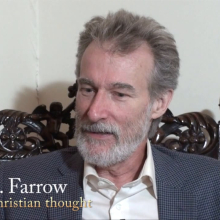Douglas Farrow
Professor of Theology and Ethics

B.R.E., M.Div., Th.M., Ph.D. (King's College London)
Historical and Systematic Theology; Theological Anthropology and Ethics; Political Theology
Professor Farrow is a Canadian citizen, married with five children. Before coming to McGill in 1998, he taught in the U.K. at King's College London, after completing his doctorate there under Colin Gunton. At McGill, alongside his lecturing and graduate supervision, he has served on the university's Academic Policy Committee, as on numerous Faculty or School committees, and engaged in the work of the Newman Institute. He pursues a broad range of interdisciplinary interests, anchored in theology, with colleagues here and elsewhere in North America or Europe. SS Paul, Irenaeus, Augustine, Anselm, Aquinas, and John Paul II provide much of the inspiration for these labours, which have a dual focus on classical theological loci and modern problems in the Church or in civil and state institutions, including the university.
Queen Elizabeth II Diamond Jubilee Medal
2019 Cardinal Wright Award
ethics: autonomy and heteronomy
ecclesiology: Petrine office
Ascension and Ecclesia: On the significance of the doctrine of the ascension for ecclesiology and Christian cosmology (T & T Clark 1999)
Recognizing Religion in a Secular Society: Essays in Pluralism, Religion and Public Policy (McGill-Queen’s 2004)
Nation of Bastards: Essays on the End of Marriage (BPS Books 2007)
Ascension Theology (T & T Clark 2011)
Desiring a Better Country: Forays in Political Theology (McGill-Queen's 2015)
Theological Negotiations: Proposals in Soteriology and Anthropology (Baker Academic 2018)
1 & 2 Thessalonians: Brazos Theological Commentary on the Bible (Brazos 2020)
See curriculum vitae for a full listing of books and articles. Some of the latter are available on Academia.edu.
For contemporary essays and commentary, see douglasfarrow.substack.com.
Theology (Patristic, Mediaeval and Modern), Theological Ethics, Political Theology
Pluralism, Religion and Public Policy
The Fortnightly Philosophy and Theology Seminar